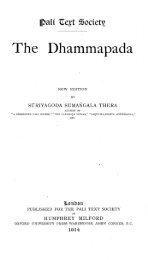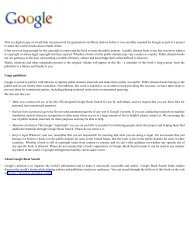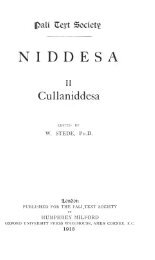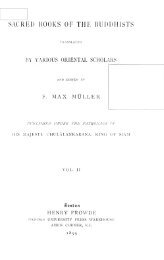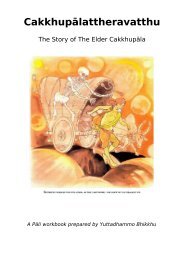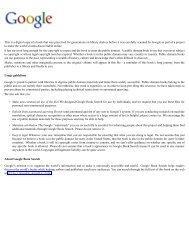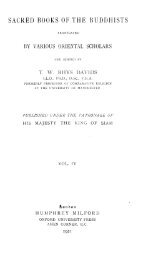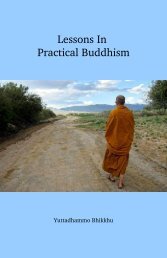Vessantara-Jataka in Pali and English - MyWebSpace
Vessantara-Jataka in Pali and English - MyWebSpace
Vessantara-Jataka in Pali and English - MyWebSpace
Create successful ePaper yourself
Turn your PDF publications into a flip-book with our unique Google optimized e-Paper software.
Translation 571 <strong>Vessantara</strong>-Jåtaka<br />
[Fausbøll, Jåtaka, vol. VI, p. 571]<br />
Then Sakka, see<strong>in</strong>g her excellent resolution, gave her praise; <strong>and</strong> the Master expla<strong>in</strong>ed it<br />
thus:<br />
"Thereat spake Sakka, see<strong>in</strong>g how her wishes did <strong>in</strong>cl<strong>in</strong>e:<br />
"Conquered is every obstacle, both human <strong>and</strong> div<strong>in</strong>e.<br />
The earth did rumble, <strong>and</strong> the sound the highest heaven fills,<br />
The lightn<strong>in</strong>g flares, the thunder wakes the echoes of the hills.<br />
Now Nārada <strong>and</strong> Pabbata to hear this mighty voice,<br />
Yea, all the Three <strong>and</strong> Thirty Gods at this hard feat rejoice.<br />
’Tis hard to do as good men do, to give as they can give,<br />
Bad men can hardly imitate the life that good men live.<br />
And so, when good <strong>and</strong> evil go to pass away from earth,<br />
The bad are born <strong>in</strong> hell below, <strong>in</strong> heaven the good have birth. 1<br />
This is the Noble Vehicle: 2 both wife <strong>and</strong> child were given,<br />
Therefore let him descend 3 no more, but this bear fruit <strong>in</strong> heaven."<br />
When thus Sakka had expressed his approval, he thought, "Now I must make no more<br />
delay here, but give her back <strong>and</strong> go"; <strong>and</strong> he said:<br />
1 This stanza is also found <strong>in</strong> <strong>Jataka</strong> No. 180 (Fausbøll, vol. II, p. 86; Cowell, vol. II, p.<br />
59), <strong>and</strong> No. 450 (Fausbøll, vol. IV, p. 65; Cowell, vol. IV, p. 42).<br />
2 "Noble Vehicle" = brahmayånam. No trace has hitherto been found <strong>in</strong> the South of the<br />
Three Vehicles of Northern Buddhism (C. Bendall <strong>and</strong> W. H. D. Rouse, Íik∑āsamuccaya<br />
(1922), p. 292; cp. M. E. Burnouf, Lotus de la Bonne Loi (1852), p. 315-316); it is<br />
therefore worthwhile quot<strong>in</strong>g the scholiast's note on the word brahmayānaṁ:<br />
"seṭṭhayānaṁ, tividho hi sucaritadhammo evarūpo dānadhammo ariyamaggassa paccayo<br />
hotīti, brahmayānam ti vuccati."<br />
3<br />
anokkamma: "apāyabhūmim anokkamitvā" used absolutely. No example <strong>in</strong> Childers.



